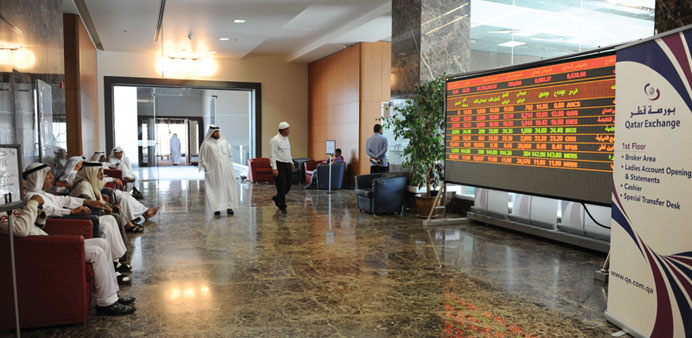By Santhosh V. Perumal/Business Reporter
Qatar Stock Exchange, which showcased 15 of its leading companies before global fund managers in London, saw its key index settle above 12,200 levels, making it the best performer among the Gulf bourses during the week, mainly lifted by small and micro cap equities.
Insurance, telecom, consumer goods and industrials were seen high in demand as the 20-stock Qatar Index gained about 1% during the week that saw a more than quadrupled earnings in the realty sector help the QSE listed companies show double-digit expansion in their cumulative net profits in the first quarter of this year.
However, the Gulf Cooperation Council markets largely came under selling pressure with Dubai declining 2.97%, Abu Dhabi (1.98%), Saudi Arabia (1.19%), Muscat (0.08%) and Bahrain (0.03%); even as Kuwait rose 0.31% during the week that saw Qatar Insurance Company win the bid to offer risk coverage to both Hamad International Airport and Doha International Airport.
Opening the week on stronger note, the market witnessed selling pressure on Monday to take the index to a low of 12,123 points. Strong buying interests in the subsequent two days helped it reach a high of 12,334 points on Wednesday; but only to see profit booking on the last day. Thus, the index settled at 12,282 points.
Qatari bourse has so far (year-to-date) reported a marginal 0.03% fall against Bahrain’s plunge of 2.55%, Kuwait’s 2.12% and Muscat’s 0.4%; while Saudi Arabia reported 16.62% surge, Dubai 8.73% and Abu Dhabi 0.57%.
The overall bullish path was supported by increased net buying support from domestic institutions and lower net selling by local and non-Qatari retail investors during the week that saw QSE chief executive Rashid bin Ali al-Mansoori disclose that the bourse witnessed a net (foreign funds) inflow of $1.25bn and about three-fold jump in average daily turnover ever since it was upgraded by MSCI and Standard and Poor's-Dow Jones last year.
However, foreign institutions’ net buying support weakened during the week that saw the Ministry of Economy and Commerce unveil a new macroeconomic model, which suggested diversification as imperative for Qatar’s long term growth.
The index that tracks Shariah-principled stocks was seen gaining much faster than the other indices in the market during the week that saw an expansion in the trading volume of the insurance and consumer goods stocks amid a decline in the overall volumes.
The 20-stock Total Return Index rose 0.97%, All Share Index (comprising wider constituents) by 1.03% and Al Rayan Islamic Index 2.17 during the week that saw more than 74% of the companies extend gains to investors.
Insurance stocks appreciated 5.23%, telecom (1.6%), consumer goods (1.34%), industrials (1.17%), banks and financial services (0.65%), real estate (0.48%) and transport (0.12%) during the week.
Of the 43 stocks, 32 gained, while only 10 declined and one was unchanged during the week that saw trading volume was largely skewed towards real estate and banking shares.
All of the eight consumer goods, seven each of the 12 banks and financial services and the nine industrials, four of the five insurers, three of the four realty, all of the two telecom and one of the three transport equities close higher during the week.
Major movers included QNB, Industries Qatar, Qatar Insurance, United Development Company, Qatari German Company for Medical Devices, Al Khaleej Takaful, Vodafone Qatar, Ooredoo, Qatar Islamic Bank, Qatari Investors Group, Salam International Investment and Gulf Warehousing during the week.
However, QIIB, Alijarah Holding, Dlala, Gulf International Services, Ezdan, Milaha and Nakilat were seen bucking the trend during the week.
Market capitalisation rose 1.03% or about QR7bn to QR660.51bn with small, micro, mid and large stocks gaining 3.21%, 2.49%, 1.01% and 0.72% respectively during the week.
Large cap equities have however fallen 5.16% year-to-date; whereas small, micro mid caps gained 10.09%, 8.12% and 3.19% respectively.
Domestic institutions’ net buying strengthened to QR54.11mn compared to QR32.44mn the week ended April 30.
Local retail investors’ net profit booking considerably weakened to QR39.86mn compared to QR66.81mn the previous week.
Non-Qatari retail investors’ net selling also fell to QR30.95mn compared to QR42.12mn the week ended April 30.
Foreign institutions’ net buying precipitously weakened to QR16.7mn against QR76.5mn the previous week.
Total trade volume was down 7% to 51.68mn shares and value by 8% to QR2.23bn but on 1% rise in transactions to 28,421 during the week.
The real estate sector saw its trade volume plummet 21% to 16.07mn equities, value by 21% to QR549.57mn and deals by 14% to 5,573.
There was 16% plunge in the telecom sector’s trade volume to 5.42mn stocks, 25% in value to QR110.35mn and 34% in transactions to 1,931.
The industrials sector’s trade volume tanked 16% to 5.53mn shares, value by 20% to QR432.37mn and deals by 7% to 5,213.
The market witnessed 11% shrinkage in the transport sector’s trade volume to 2.43mn equities and 6% in value to QR117.45mn but on 6% rise in transactions to 1,576.
However, the insurance sector’s trade volume shot up 46% to 0.73mn stocks, value by 28% to QR39.39mn and deals by 75% to 586.
The consumer goods sector saw its trade volume surge 25% to 9.36mn shares, value by 4% to QR236.56mn and transactions by 30% to 4,449.
The banks and financial services sector reported 5% expansion in trade volume to 12.14mn equities, 13% in value to QR741.2mn and 14% in deals to 9,093.
In the debt market, a total of 47,000 treasury bills valued at QR466.73mn traded across five transactions; while there was no trading of government bonds during the week.

